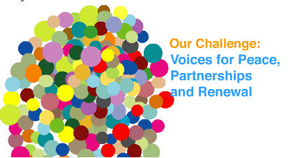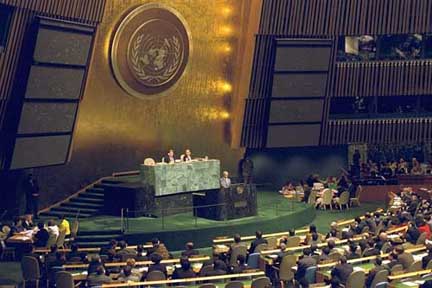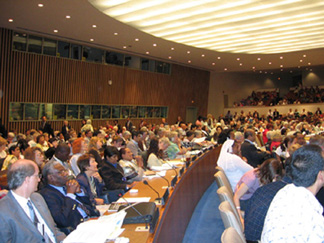|
no. 4 october - december 2005 Carmelite NGO Participates in 58th Annual NGO Conference in New York Three members of the Carmelite NGO participated in the 58 th annual conference of DPI/NGO (those NGO’s affiliated with the UN’s Department of Public Information) September 7-9, 2005 at the UN headquarters in New York. The Conference, entitled Our Challenge: Voices for Peace, Partnership and Renewal, brought together an estimated 2,000 NGO representatives and other civil society partners from more than 80 countries. There are 1,400 NGO’s affiliated to the UN Department of Public Information.
Sr. Helen Ojario from the Congregation of Our Lady of Mount Carmel was able to attend despite having been evacuated from New Orleans because of Hurricane Katrina. Also attending was Br. Hariawan Adji, a member of the Indonesian Province, and Ms. Veronica Treanor Heekin, a member of the Third Order from the St. Elias Province in the USA. While the conference is closed to the general public, an interactive website enabled social activists from around the world to participate in the discussion of issues. An online discussion area was launched four weeks prior to the conference to encourage an exchange of ideas before the actual event. In addition to seven plenary sessions and three roundtables, there were 30 interactive workshops sponsored by NGO partnerships and coalitions from around the world with participation by governments, intergovernmental organizations and civil society representatives. "I attended the plenary sessions, some noon workshops and morning and afternoon panel sessions," said Veronica Heekin, reflecting on her participation. "The Friday morning roundtable I attended was entitled ‘Eradicating Poverty: Timelines and Lifelines.’ As with most conferences, the panel members were diverse, including those whose acquaintance with the poor appears purely theoretical and those who are in the field and on fire. Of these latter, the ones with both experience and sustained zeal are the most helpful." The themes of the workshops focused on four clusters of the Secretary-General’s report: Freedom from Want (two sessions), Freedom from Fear, Freedom to live in Dignity, and Strengthening the United Nations. The Conference also provided thematic networking sessions from NGO representatives. Other initiatives included media and exhibition projects that explored NGO voices in implementing the 2005 World Summit agenda. During meetings of the General Assembly following the 2005 World Summit, ministers from around the world called the outcome of the Summit "disappointing" but stressed that reform of key United Nations bodies should continue. Member States were urged to keep up the momentum generated by the Summit, which, despite its limited results, had endorsed Secretary-General Kofi Annan’s call to revitalize the sixty-year-old Organization by upgrading the Security Council; creating a new, more effective human rights body; and green-lighting a new Peacebuilding Commission, that would develop integrated strategies for post-conflict reconstruction. The current Secretary General has continuously stressed the need to strengthen the voice of the NGO’s at the UN. Recognizing that Civil Society was intended to be one of the pillars of the UN at its founding, Mr. Annan has worked to strengthen the procedure for admission of NGOs as well as the annual review process of affiliated NGOs. He has also repeatedly stressed that the eyes, ears, and hands of the UN in many parts of the world are its NGOs.
As of mid-2005 there were a total of ten "major wars" inflicting 1,000 battlefield deaths per year and 24 "lesser" conflicts according to NGO resources. Seventy-five per cent of people killed or wounded in wars are non-combatants. Last year witnessed an unprecedented surge in United Nations peacekeeping operations raising hopes and prospects of ending conflicts and bringing peace to war-torn countries. Currently the UN is involved in 16 peacekeeping operations. However, half of all countries that emerge from wars fall back into violence within five years. The Secretary-General has proposed the establishment of an intergovernmental Peacebuilding Commission. That Commission’s primary responsibility would be to harmonize peacebuilding activities across the multilateral system, bringing together the different international and regional actors involved and providing a forum for sharing information on their respective post-conflict strategies. As an advisory body, the Peacebuilding Commission would report to the Security Council and to the Economic and Social Council (ECOSOC). The Commission would be comprised of an equal number of Security Council and ECOSOC Member States, major troop contributing and donor States and major national and regional actors. Such a Peacebuilding Commission would fill the gap in the UN system as there is no machinery in place to ensure sustainable peace and effectively address the challenges facing countries in transition from war to peace. Human Rights – Humanitarian Intervention The controversy surrounding humanitarian intervention lies in the tension between two of the major values of the Charter of the United Nations: ensuring respect for fundamental human rights and respect of sovereignty of states and non-intervention in internal affairs. However, in cases such as Somalia, Haiti, Democratic Republic of Congo, Liberia, Côte d’Ivoire and Kosovo where there was severe and en masse violation of human rights, the UN Security Council did intervene. While human rights violations often trigger internal disputes, violations alone are not always considered to be a threat to international peace and security which would bring about Security Council action of some sort. In order to prevent violations against human rights, the Commission on Human Rights was established. The effectiveness of this body is continuously questioned and undermined by its declining credibility and professionalism as states use their membership to protect themselves against criticism. For these reasons, the Secretary-General is proposing that a smaller Human Rights Council replace the existing Commission on Human Rights. The new Council, with more authority to investigate violations and to enforce compliance with the Declaration of Human Rights, could play a crucial role in early-warning systems and conflict prevention. The Role of the NGOs and Civil Society Over the past few years, NGOs have played a key role in furthering political change and promoting sustainable development policies. They are the organizations that will be doing the major portion of the work necessary to achieve the Millennium Development Goals. The Secretary-General has recognized the increasingly important role of the NGOs and has instituted a process of reviewing and revitalizing relations between the UN and the civil society actors. The Informal General Assembly Hearings, in June 2005, provided a historic moment as NGOs had the opportunity to stand up for increased and strengthened participation of the wider civil society in the UN system. As part of this more significant role, the Millennium+5 NGO Network conducted a series of consultations and published a report entitled We Will Spare No Effort, which contains the views and recommendations of civil society to be put forward at the 2005 Summit.
The first time I arrived at the UN building in New York to register I was very surprised because I saw a lot of people standing in line. Some of them were very old, some were middle aged, and very few were young. I found out that some of the older ladies with short hair were wearing a necklace with a cross. I talked to them and they introduced themselves as Catholic sisters. They told me there were many other religious who participated in the conference. One of the topics of the first session is about the role of NGOs. An NGO is a non-profit organization founded by members of civil society. But there are actually a lot of NGOs which are founded to collect money. There are also many NGOs founded by governments. Their intentions are certainly not pure. NGOs founded to collect money will not work for the people but for the sake of themselves. Of course they will be on the side of the one who can give them more money. Their definition of justice and peace will be based on the sum of money. NGOs founded by governments get their funding from the government. So they will not be on the civil society side but on the government side when there is conflict. I met some of these government NGOs at the conference. They were very angry and objected when the speakers criticized the governments. I know that becoming a good NGO is not easy nor is it safe. Last year Munir, one of NGO activists in Indonesia, was poisoned when he was flying to Holland to attend a meeting there. The police said that he died of a heart attack. After a very careful investigation, however, it was found that he was poisoned. People said that he was killed because of his work in justice and peace. Sometimes he fought with the government. Now his case is in process, but it is quite difficult to win the truth. Since his death, many NGOs who usually actively criticized the government have fallen silent. Most of the activists are afraid to end up as Munir did. If this fear continues forever, I am sure justice and peace will be only a beautiful dream for all of us. It will really be a dream that will not come true. Who else can we rely on then? The answer is us. Our vocation is to follow Jesus Christ, not only in His glory but also in His fight against the unjust powers. He took the risk to argue and fight with the scribes and Pharisees who gave burdens to the people (Luke 11:37-54). He did not care whether it might risk His life. What He had to do was to help the weak and to tell the truth. We, as His followers, surely must imitate what he did. We must fight for the justice and peace of the world, regardless if we are then at risk. As Carmelites we have a very good example for this, the prophet Elijah. His and our Order’s motto, Zelo Zelatus Sum Pro Domino, which means working hard for the sake of the Lord, can be a good inspiration for us in living our vocation. Working hard for the sake of the Lord also means working hard for the poor and the weak. But how do we have to do this? I am sure that the work of our Carmelite NGO will not be the same as that of secular NGOs. Our spirituality, of course, will color our work. We do not just fight for justice and peace (like what secular NGOs do) but we fight because of our love to the Lord. And I am sure that the result will be much better. Francis Xavier Hariawan Adji, O. Carm. |
|
RETURN TO THE INDEX FOR 2005 | RETURN TO THE INDEX FOR THIS ISSUE INDEX OF CARMELITE
WEBSITES |

 The conference was intended to raise public awareness of the report of
UN Secretary-General Kofi A. Annan entitled In Larger Freedom: Towards
Development, Security and Human Rights for All, which outlines the
agenda for the 2005 World Summit which was to begin the week after the NGO
conference. It was an opportunity for the NGOs to voice their views on
implementation of the Millennium Development Goals (MDGs), peace and
security, human rights, and strengthening the United Nations.
The conference was intended to raise public awareness of the report of
UN Secretary-General Kofi A. Annan entitled In Larger Freedom: Towards
Development, Security and Human Rights for All, which outlines the
agenda for the 2005 World Summit which was to begin the week after the NGO
conference. It was an opportunity for the NGOs to voice their views on
implementation of the Millennium Development Goals (MDGs), peace and
security, human rights, and strengthening the United Nations.
